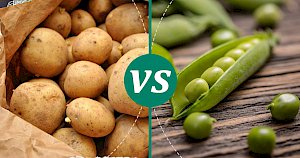Peas vs Potato: Calories & Nutrition Showdown


Peas vs Potato
Nutrition Facts
Serving size:
change
5g10g15g20g30g40g50g60g80g100g120g140g160g180g200g220g250g300g350g400g450g500g600g700g800g900g1000g
1oz2oz3oz4oz5oz6oz7oz8oz10oz12oz15oz20oz25oz30oz35oz40oz50oz
Amount Per Serving:
Serving size:
change
5g10g15g20g30g40g50g60g80g100g120g140g160g180g200g220g250g300g350g400g450g500g600g700g800g900g1000g
1oz2oz3oz4oz5oz6oz7oz8oz10oz12oz15oz20oz25oz30oz35oz40oz50oz
Amount Per Serving:
Peas vs Potato 100g Compare
| per 100g | Peas | Potato |
|---|---|---|
| Calories | 81 | 77 |
| Carbohydrates | 14.45 g | 17.49 g |
| Fat | 0.4 g | 0.09 g |
| Saturated fat | 0.07 g | 0.01 g |
| Dietary fiber | 5.7 g | 2.1 g |
| Protein | 5.42 g | 2.05 g |
| Water | 78.86 g | 79.25 g |
| Calcium | 25 mg | 12 mg |
| Iron | 1.47 mg | 0.81 mg |
| Magnessium | 33 mg | 23 mg |
| Potassium | 244 mg | 425 mg |
| Sodium | 5 mg | 6 mg |
| Vitaminium A | 765 µg | 2 µg |
| Vitaminium B1 (Thiamine) | 0.266 mg | 0.081 mg |
| Vitaminium B2 (riboflavin) | 0.132 mg | 0.032 mg |
| Vitaminium B3 (Niacin) | 2.09 mg | 1.061 mg |
| Vitaminium B5 | 0.104 mg | 0.279 mg |
| Vitaminium B6 | 0.169 mg | 0.298 mg |
| Vitaminium B9 (Folic acid) | 0.065 mg | 0.015 mg |
| Vitaminium C | 40 mg | 19.7 mg |
| Vitaminium E | 0.13 mg | 0.01 mg |
| Vitaminium K | 0.025 µg | 0.002 µg |
| Beta karoten | 449 mg | 4 mg |
Delving into the Nutritional World of Peas and Potatoes
Peas and potatoes are staples in kitchens around the globe, each bringing their unique flavors and nutritional benefits to a multitude of dishes. From hearty winter stews to light and refreshing summer salads, these vegetables are versatile, delicious, and packed with nutrients. But when it comes to their nutritional profiles, how do peas and potatoes compare? Let's take a closer look at the fascinating world of peas and potatoes, starting with some interesting facts that might surprise you.
A Peek into Peas and Potatoes
Peas, known scientifically as Pisum sativum, are small seeds that come from the pods produced by the pea plant. Interestingly, peas are considered a fruit since they contain seeds and develop from the ovary of a (pea) flower. However, in the culinary world, peas are treated as a vegetable. They're not only a staple in many diets but also a source of plant-based protein and fiber.
On the other side of the garden, potatoes, or Solanum tuberosum, have been a fundamental food source for centuries. Originating in the Andes Mountains of South America, potatoes have traveled the world and have been adapted into countless regional dishes. They are incredibly versatile, serving as a primary ingredient in recipes ranging from baked, mashed, and fried to being used in soups and stews.
Nutritional Face-Off: Peas vs. Potatoes
When comparing the nutritional content of peas and potatoes, it's clear that both vegetables are healthful choices, but they serve different nutritional purposes in a diet. Here's a breakdown of their nutritional content per 100 grams:
- Calories: Peas contain slightly more calories (81) than potatoes (77), making them both low-calorie food options.
- Carbohydrates and Fiber: Peas have a higher fiber content (5.1g) compared to potatoes (2.1g), which is beneficial for digestive health. However, potatoes have a slightly higher carbohydrate content.
- Protein: Peas are a superior source of protein (5.42g) in comparison to potatoes (2.05g), making them a great choice for vegetarians and vegans looking to boost their protein intake.
- Vitamins and Minerals: Peas are rich in vitamins A and C, iron, and magnesium, while potatoes provide a generous amount of potassium and vitamin C.
Both peas and potatoes contain negligible amounts of fat and no cholesterol, making them heart-healthy options. Additionally, peas offer a good dose of plant-based iron and magnesium, which are essential for energy production and maintaining healthy blood.
What's the Best Choice?
Ultimately, the choice between peas and potatoes depends on your dietary needs and preferences. If you're looking for a low-calorie option rich in fiber and protein, peas might be the way to go. On the other hand, if you're in need of a potassium boost or just love the versatility of potatoes, then potatoes might be your best pick.
Regardless of your choice, incorporating a variety of vegetables into your diet is key to getting a wide range of nutrients. Whether you prefer peas, potatoes, or a mix of both, you're making a healthful choice that contributes to a balanced diet.
In conclusion, both peas and potatoes offer unique nutritional benefits and can be enjoyed in a myriad of ways. So why not get creative in the kitchen and experiment with both? After all, variety is the spice of life and the foundation of a healthy diet.
Peas 100g
81kcalCalories source
- 70% CARBS.
- 26% PROTEIN
- 4% FAT
Potato 100g
77kcalCalories source
- 89% CARBS
- 10% PROTEIN
- 1% FAT
Compares of peas
- Peas vs Artichoke
- Peas vs Asparagus
- Peas vs Beetroot
- Peas vs Pepper
- Peas vs Broccoli
- Peas vs Brussels Sprouts
- see all compares of peas
Marcin Piotrowicz
calories-info.com creator
Healthy diet and healthy lifestyle promoter
Add comment